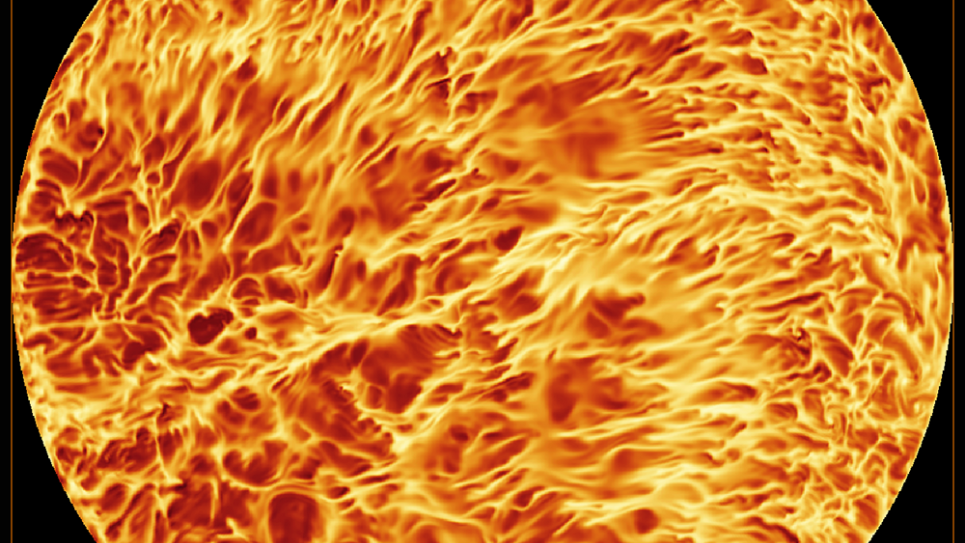
INCITE grants awarded to 62 computational research projects
The U.S. Department of Energy’s (DOE) Office of Science announced 62 projects for 2019 aimed at accelerating discovery and innovation to address some of the world’s most challenging science problems through its Innovative and Novel Computational Impact on Theory and Experiment (INCITE) program. Deploying on supercomputers that rank among the country’s most powerful, the projects originate in national laboratories, academia, and industry, and encompass a remarkable range of scientific inquiry.
The awards allocate the resources of the DOE Leadership Computing Facilities at DOE’s Argonne and Oak Ridge National Laboratories. The two centers jointly manage the INCITE program as a principal conduit for their dedication to open science. As the primary means to access the facilities’ computing resources, INCITE proposals are awarded on a highly competitive basis. Projects span disciplines ranging from high-energy physics and materials science to biochemistry and engineering. Computational and domain scientists at the facilities partner with investigators to develop new computational methods, assist and optimize code development, streamline workflows, analyze and visualize data, and troubleshoot glitches.
“The breakthroughs these projects could affect have the potential to fundamentally alter the scientific landscape as we know it. Some of them will build on previous research to move in new and exciting directions, while others are wholly original,” said Michael E. Papka, director of the Argonne Leadership Computing Facility (ALCF), a DOE Office of Science User Facility. “However, because of their scale, these problems really cannot be tackled elsewhere. And the world-class expertise of our staff is as essential to the success of this work as the machines themselves.”
“The array of projects we have lined up for 2019 continues to reflect a computational portfolio aimed at making major scientific advances across a broad range of science and engineering disciplines,” said James Hack, director of the National Center for Computational Sciences, which houses the Oak Ridge Leadership Computing Facility (OLCF), a DOE Office of Science User Facility. “We look forward to enabling some of the most sophisticated computational science research occurring anywhere in the world.”
The INCITE program commenced in 2004 with three inaugural projects totaling five million core hours. Since then, the ALCF and OLCF have continuously undergone significant upgrades to retain their edge in facilitating the most computationally demanding scientific projects. The ALCF’s most recent machine is Theta, an 11.69-petaflop Cray XC40 system with 280,000-plus cores to make it ideal for research at the nexus of simulation, data science, and machine learning. An even more powerful system, the exascale Aurora, is planned for deployment in 2021 and is projected to be capable of a quintillion (one billion billion) calculations per second.
The OLCF, meanwhile, boasts the 27-petaflop Titan supercomputer, a Cray XK7 hybrid system powered by both CPUs and GPUs across nearly 19,000 nodes. Most importantly, beginning in January 2019, OLCF’s new 200-petaflop supercomputer, Summit, an IBM AC922 machine, will be available to users for the first time during this INCITE allocation cycle.
For a complete list of 2019 INCITE awards, please visit: http://www.doeleadershipcomputing.org/awards/2019INCITEFactSheets.pdf
Highlights of the 2019 allocations include:
- Alexander Tchekhovskoy from Northwestern University received 850,000 Summit node-hours to address two longstanding mysteries in astrophysics: how neutron star collisions produce heavy elements like gold and platinum, and how black holes break up red-hot disks of gas feeding them.
- Sean Dettrick from TAE Technologies received 750,000 Theta node-hours to perform simulations that will accelerate the company’s experimental research program in the magnetic confinement of plasmas, with the goal of creating a clean, commercially viable, fusion-based electricity generator.
- Ron Dror from Stanford University received 4,540,000 Titan node-hours and 400,000 Summit node-hours to reveal how drug receptors select which signaling proteins to activate so as to enable the development of finely tuned medicines that yield desired effects with fewer side effects.
- Janet Scheel from Occidental College received 12,500,000 Mira node-hours to simulate turbulent heated convection in air at the highest Rayleigh numbers ever obtained in a direct numerical simulation. The results will shed light on the ultimate regime of convective turbulence where there should be significantly enhanced heat transport.
- Dario Alfe from University College London received 1,210,000 Titan node-hours and 40,000 Summit node-hours to perform quantum Monte Carlo simulations that will provide high-accuracy data for the adsorption of water on graphene. This data will have applications in water purification, desalinisation and drug delivery.
- Aleksandr Obabko from Argonne received 17,700,000 Mira node-hours for thermal-hydraulics simulations of nuclear reactors to enable better reactor designs.
The INCITE program promotes transformational advances in science and technology through large allocations of time on state-of-the-art supercomputers. For more information, please visit: http://www.doeleadershipcomputing.org/incite-program
Argonne National Laboratory seeks solutions to pressing national problems in science and technology. The nation’s first national laboratory, Argonne conducts leading-edge basic and applied scientific research in virtually every scientific discipline. Argonne researchers work closely with researchers from hundreds of companies, universities, and federal, state and municipal agencies to help them solve their specific problems, advance America’s scientific leadership and prepare the nation for a better future. With employees from more than 60 nations, Argonne is managed by UChicago Argonne, LLC for the U.S. Department of Energy’s Office of Science.
The U.S. Department of Energy’s Office of Science is the single largest supporter of basic research in the physical sciences in the United States and is working to address some of the most pressing challenges of our time. For more information, visit the Office of Science website.